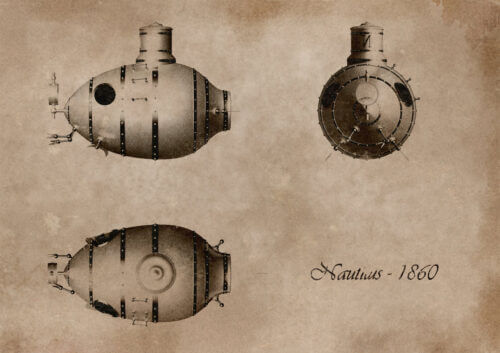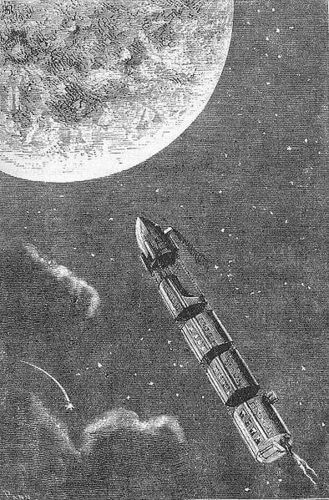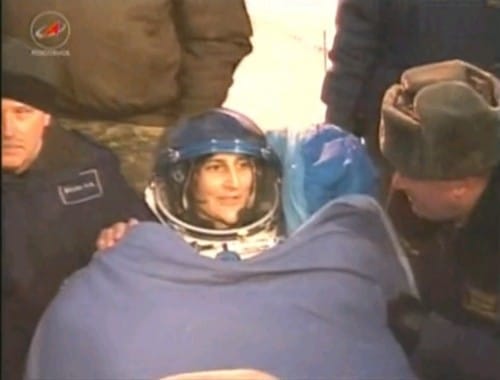Surprisingly, it's not the science fiction writers, nor the futurists - but science fiction writers who have many times succeeded in predicting the future: flights into space, satellites, submarines, even the credit card and the iPad. And how creepy, two Israeli writers managed to predict the corona epidemic
Written by: Ariel Kers
of: Young Galileo, issue 197 June 2020

Human culture is based on planning the future. We are the only animal on earth that makes long term plans. But during a crisis like the one brought upon us by the Corona epidemic, it is very difficult to plan anything. All the plans we had - studies, work, trips, vacations, birthday celebrations - were cancelled. So if one virus is capable of disrupting humanity's plans, how can anything even be predicted?
From the possible to the impossible
People have always tried to predict the future: once it was prophets or informants, and today futurists try to predict the future with the help of science. However, only a few vaguely predicted the corona epidemic, or to differentiate the invention of the smartphone, because the future is too complex to predict.

And here it is - a surprise! Those who sometimes succeed in predicting future developments are actually writers. Quite a few science fiction writers managed to guess the future with surprising accuracy. The famous author Arthur C. Clarke, who foresaw among other things the invention of communication satellites, wrote in 1962: "The only way to discover the limits of the possible is to go a little beyond them, into the impossible." Here are some amazing predictions by writers:
Flight into space: Cyrano de Bergerac, 1657
The famous astronomer Johannes Kepler came up with the idea of flying to the moon in his composition "Somnium" ("The Dream") in 1608. The idea was so strange at the time that Kepler chose demons to transport the hero to the moon. But the French writer Cyrano de Bergerac decided that a machine would fly the hero of the story "The Other Worlds: The States and Empires of the Moon" to the moon with the help of fireworks. It is very reminiscent of a rocket with an internal combustion engine, like the rockets used today for space flights. De Bergerac was 300 years ahead of his time!
Submarines: Margaret (Lucas) Cavendish, 1666
Many attribute the appearance of the first submarine in literature to Jules Verne, author of "20 thousand miles under water" which was published in 1870. But the idea of the submarine was already mentioned in the book "A World in Flames" by the British Margaret (Lucas) Cavendish from 1666. It was probably the first literary description of a utopian world written by a woman, and an initial example of the science fiction and fantasy genre.
Talking Machine: Jonathan Swift, 1726
The Irish Jonathan Swift, author of Gulliver's Travels, wrote satires on scientific publications. He mocked the arrogant scientists and invented a talking machine that invents sentences by itself and even writes articles and books without human help. Although it was satire, today there are computers with artificial intelligence that can use language "independently".
Oxygen in space travel: Jane Webb Loudon, 1828

Science fiction writer Jane Webb Loudon envisioned in her book "The Mummy: A 22nd Century Story" a future in which women wear pants (!) and automatons (robots) serve as surgeons and lawyers. Loudon realized that in order to survive in space travel it would be necessary to take air to breathe. Today it goes without saying, but she was the author who wrote about it for the first time.
Credit cards: Edward Bellamy, 1888
Edward Bellamy's book "Looking Back: 2000 to 1887" included a description of a utopian American society that uses a type of credit card. Bellamy's cards have a certain amount allocated to the card holder, with which he can buy products. Credit cards only began to be used about 60 years later.
Electric fence: Mark Twain, 1889
The American author Mark Twain is known for his excellent stories, satires and travelogues, and less for thefuturology His. In his book "A Connecticut Yankee in King Arthur's Court", an American engineer goes back in time to the Middle Ages. The engineer there, thanks to his modern technological abilities, is given the status of a "leading wizard". One of his inventions is the electric fence, which helps King Arthur defend himself from his enemies. Real electric fences came into use in the United States in cattle pens only in the 30s.
Video conference: Jules Verne, 1889
In the book "In the year 2889" the French science fiction writer Jules Verne described a device that enables communication between people with the help of screens. This book also predicted the news broadcasts and the filmed and recorded news. As we know, all this came a long time before the year 2889.
Radar: Hugo Gernsback, 1911
Hugo Gernsbach's vision was not only original but also detailed. The name of his book of short stories, from which the description was taken, was "Ralph 124c 41+" - a pun on an English phrase whose free translation is "one who must witness each other". Reminds a little of the abbreviations in today's WhatsApp messages...
"Pulses of a polarized wave aimed at a metallic object will be reflected just as a ray of light is reflected from a shiny surface," Gernsback wrote. "If we allow the device to move from side to side, like the light of a flashlight, we can cover a large area. Sooner or later these waves will hit some flying object. After the waves hit... they will be returned to the facility that launched them. The device will only detect the waves that are returned... with the help of the strength of the waves and the intervals between them, it will be possible to determine at what distance the flying object is." Amazing, right? It was only in 1935 that a radar device was created for the first time that could detect distant objects by sending and receiving signals.
Nuclear bomb: Herbert George Wells, 1914
The most terrifying legacy of science fiction is the inspiration it provided for the development of the nuclear bomb. In the book "The World is Set Free" the writer and radio personality H. Wells predicted that a new type of bomb fueled by nuclear reactions would explode in 1956. It happened earlier.
The Hungarian-American physicist Leo Szilard read the book and promoted the idea. Szilard was involved in the "Manhattan Project", which produced the nuclear bombs that were dropped on the Japanese cities of Hiroshima and Nagasaki at the end of World War II in 1945.
Wells foresaw not only the construction and use of the nuclear bombs but also the terror they would inflict on the world, the widespread radioactive destruction and the deadly radiation that would be left long after the fighting was over.
Cyborg: Edwin Vincent Odell, 1923
One of the main characters in the book "The Clockwork Man" by writer Edwin Vincent O'Dell (some believe it was the pen name of writer Virginia Woolf) is a cybernetic organism, or cyborg - a being made of both biological and artificial components, a man-machine. The cyborg in the story accidentally arrived in our world in 1923. The book examines what happens to humans who live in a limitless cybernetic world and use machines as part of their bodies. Today, science produces artificial organs for humans as a matter of routine.
Microwave in a spaceship: Robert Heinlein, 1948
In the book "Space Cadets" Robert Heinlein took the idea of the microwave - a modern invention at the time - one step further. He predicted that the food that will be served in spaceships will be prepared in advance, and it will be possible to heat it in a microwave in a few seconds. Today it seems to us quite ordinary.
Little Headphones: Ray Bradbury, 1950
In the book "Fahrenheit 451" Ray Bradbury described small headphones that are much more comfortable to use than the huge devices that were worn on the head in his time. He likened these headphones, which go into the ears, to small clams with the help of which you can hear the "ocean of sounds, music and conversations coming from around the world". Of course, almost every one of us has such headphones today.
Artificial intelligence surpassing that of humans: Clifford Simack, 1951
In the book "Over and Over Again" Clifford Simak described a chess game between a human and a robot. The man, Mr. Benton, designed the robot Oscar - and the robot beat him in all the chess games between them. Simak's vision was realized in 1997, when the chess software "Deep Blue" defeated the world chess champion Garry Kasparov. Today, computers are able to perform many tasks much better than the smartest and most talented humans, thanks to their enormous computational power.
iPad: Arthur C. Clarke, 1968
In the book that was adapted into a successful movie "2001: A Space Odyssey" Arthur C. Clarke described the "Newspad" - an electronic device that can be used to connect from space to what is happening on Earth. His space pilot kept up to date with everything written in the "electronic newspapers". Today's iPads are, of course, capable of much more than just news updates.
Electric car: John Brunner, 1969
John Bruner's book "Standing on Zanzibar" is probably one of the most prophetic books. Its plot takes place in 2010: America during the administration of President Obomi (!), plagued by school shootings and terrorist attacks. The European Union already exists, big cities like Detroit are becoming slums, smoking is prohibited in many places, and the LGBT community is gaining legitimacy. The new inventions are, among others, television on demand (what we call VOD), laser printers and electric cars. Bruner was a true prophet.
Immediate translation: Douglas Adams, 1979
In the book "The Hitchhiker's Guide to the Galaxy" author Douglas Adams introduces the imaginary animal "Babylon Fish". The name of the fish comes from the story of the Tower of Babel - the biblical explanation for the formation of the different languages. Adams touches with humor on a topic not common in science fiction books: language differences between cultures.
If you put the "Babylon Fish" in your ear, it immediately translates any language, and you can understand any alien you meet on your travels in the galaxy. Today there are applications that do this, and immediately translate phone calls, for example your conversation with a Mandarin speaker from China. It can be assumed that this field will go and develop rapidly in the global world where everyone talks to everyone.
Everyday use of the Internet: David Breen, 1990
In the book "Earth" David Breen predicted some impressive prophecies. One of them was the widespread use of the Internet. In those days, the WWW was a new phenomenon that no one had any idea about its future. Breen predicted that in the 21st century people will regularly use screens full of clickable links. Today it seems completely clear to us.
A global epidemic: Hamotel Shabtai, 1997
In 1997, the Israeli writer Hamotal Shabtai published the book "2020" (Crown Publishing), which deals with the dire consequences of the outbreak of a global epidemic. The book accurately predicted the year in which the plague would break out, and it describes what is happening in the "healthy domain" as opposed to the quarantine zone where those infected with the disease are concentrated, as well as the global anxiety and the changes in humanity's habits in a crisis situation. creepy.
Global Pandemic: Maggi Utzi, 2019
Another Israeli writer who saw the birth is Maggie Otzi, who published last year "Einim Adomum" (Kinneret Zamora Dvir Publishing), a story about a virus that spreads by touch. The book presents a world that was hit by a plague, and its inhabitants were unable to overcome it. The book describes a country divided and split into separate camps of secular, ultra-Orthodox, religious and Arabs. Severe hunger prevails there, and there are severe restrictions on the consumption of electricity and water. The army serves as a policing force and repression of the citizens, and there is a curfew on the streets.
Box
A developed imagination and cultural sensitivity

An interview with the writer Maggie Otzi, who predicted in her book "Red Eyes" the outbreak of a global epidemic
Do you have an explanation for the amazing ability of writers to see the future better than other people? How do writers succeed where scientists fail? Do they have the ability to understand processes hidden from view?
"I think it's a combination of things: a developed imagination is required, the leisure to surrender to this imagination without fear or inhibitions, as well as cultural sensitivity and originality to connect the ills (or dreams) of society with events that seem random, or at least not directly related to them.
Jules Verne, for example, predicted the development of the fax machine. I suppose he had a cultural sensitivity to the strong need that people have to communicate with each other from afar quickly and efficiently, with enough imagination to conceive a device that could do it."
And there is, of course, another option, no less fascinating. "In everything that concerns writers or creators who invent inventions - it is possible that the writers give human society, including scientists, ideas for ventures," says Maggie. "The practical scientists begin to research and invent and put the imaginative ideas of the writers into practice. In such cases, the literary imagination is not a self-fulfilling prophecy, but it is the meeting between writers and scientists."
And what about your book?
"In my book, I connected the precarious political situation in Israel and the rise of separatism and racism around the world to a future disease that will synchronize with this tendency - a disease that will limit the possibility of people touching each other and oblige them to isolate themselves and stay away from each other."
Join us on Facebook https://www.facebook.com/YoungGalileo
More of the topic in Hayadan:

11 תגובות
The microwave also appears in Heinlein's excellent 'God of the 21st Century'. I remember imagining such a meal when I was reading at the time, years before the device arrived in Israel at a reasonable price (even though it was known in America from the sixties).
In 1940, the FBI arrested for investigation an American MDB writer, who accurately described a nuclear bomb... a well-known story.
Also with Heinlein, you can find fascinating predictions about modern high-tech, in 'The door leading to summer'.
There are countless works on plagues. Usually, to make it interesting, this is a much deadlier epidemic than the corona. I'd be surprised if anyone predicted a global shutdown due to a disease that will likely kill fewer people by 2020 than cigarettes or sugar (look up the data).
Why does this surprise you? These are also self-fulfilling prophecies because if someone wrote that there would be such and such a thing then we would want to create such and such a thing because it is cool. And this is also their job, to write books about how they think the world will look in the future, that's what they earn a living from.
I don't understand how Nikolay Tesla was left out.
Erich Kastner predicted quite a few inventions in his book "The 35th of May" (autonomous cars, moving sidewalks, fast food stands and more),
And Asimov too
I loved the article!
By the way - regarding who predicted the epidemic - this is something that annoys me - if it is not a prediction of a worldwide shutdown and a severe recession, I am not impressed. Every average zombie book talks about how a virus spreads around the world and destroys civilization. There are those who score better on the new releases, and there are those who stay away. It cannot be claimed that only a few predicted an epidemic when it is an event that happens every few years - each time a different virus. Last year it was measles, before that Sars and March and swine flu and AIDS... all the time epidemics, including the Spanish flu that caused names 100 years ago.
When Bill Gates has been lecturing about the danger of epidemics for 5 years and more - it cannot be argued that this is a surprise.
I am of the opinion that this is a self-fulfilling prophecy - someone has to come up with the original idea for another person to want to realize it and create one in the real world.
Example – Babel Fish was a nice free translation software for a while on the internet – named after the creature from Addams' story.
post Scriptum. Aria, electricity, calories - same thing. Energy consumption is not what differentiates us from machines, it is one of the common things. I bet that intuition will be the last thing to become electronic - chaos and not order...
Arthur S. Clark predicted that in 2001 there would be an artificial intelligence that would be able to make decisions on its own "behind the backs" of humans and he was wrong big time. And my prediction (write it down) is that it will never happen. Because there is a fundamental difference between humans and machines and it is that we are animals, animals. Only we have motivation, creativity, urges, desires and all these are the result of a need to exist, which machines do not have. A machine only needs a power source.
The Hitchhiker's Guide to the Galaxy is itself a prediction of what you earthlings call Google, which replaces the encyclopedias you had to carry and actually browse and read in them....to know something.
When you reach us in space, you will find out that Mr. Adams "predicted" a few more things.
The quotation marks are because he did not foresee in the Hertzian sense, but simply saw in one of his many meetings with the so-called Ford Perfect
The Nephilim Rebellion and 1984 accurately predict where the world is going and not the rant at the end of the article.